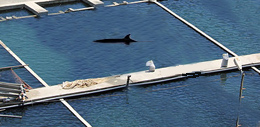The hosts of NPR's
All Things Considered read
a sample of listeners' comments about a previously-aired story involving a plan to use farm-raised whales as an alternative source of energy. The whales were being raised on a farm in Bellesville, Illinois in "hundreds of acres of wide pools as far as the eye can see."
One listener remarked that there was nothing remarkable about such a farm since "Cetaceaculture, or whale farming, is already a big business in Europe."
Several others focused on a detail involving the claim that a local resident, Reed Summers, was teaching the captive whales to sing in three-part harmony.
One listener objected that two of the whales were "plainly singing the same note," which meant it wasn't three-part harmony. Another noted that whales in the wild naturally sing. Therefore, Summers didn't deserve "all the credit" for getting them to sing in captivity.
Yet another listener noted that NPR got the name of the town wrong: "Your reporter said Bellesville, Illinois. That's a common mistake, but I expect more from NPR. It's Belleville."
In reality, NPR had never aired such a story, nor had it received any of the comments that were read. But for a while after the segment, "farm-raised whales" was the top search on Google.
Reed Summers and the town of Belleville had been featured in a previous April Fool segment aired in 1997 about a
"mouth sounds competition." Art Silverman, senior producer of
All Things Considered, later explained that he used Belleville since it was the hometown of fellow producer Sean Collins, who did the voice of Summers.
Links and References


Comments